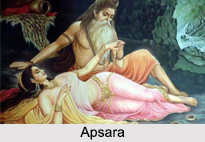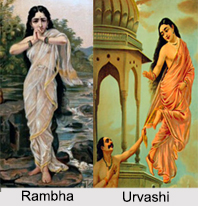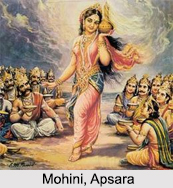 Apsaras in Indian Mythology are the court dancers of the king of Gods, Lord Indra. It is Lord Indra, under whose instructions the Apsaras seduce mortals, kings and sages, who became powerful enough to threaten the mighty Indra. Apsaras are celestial maidens of exquisite beauty and alluring charm and artistically blessed with power of dancing and singing. They have will power so that they can change their body to any forms as and when desired.
Apsaras in Indian Mythology are the court dancers of the king of Gods, Lord Indra. It is Lord Indra, under whose instructions the Apsaras seduce mortals, kings and sages, who became powerful enough to threaten the mighty Indra. Apsaras are celestial maidens of exquisite beauty and alluring charm and artistically blessed with power of dancing and singing. They have will power so that they can change their body to any forms as and when desired.
Origin of Apsaras
Sage Kashyapa, who has many wives, is considered as father of many celestial races. The demi-gods are born from his wife Aditi and demons come from his other wife Diti. While the Bhagavata Purana states that Apsaras were born from Kashyapa and Muni, it is in the Mahabharata, Pradha is mentioned as Apsaras" mother. In other ancient legends, it is said that the Apsaras came out during the churning of the sea.
Gandharvas
The male counterparts of the Apsaras are the Gandharvas, who are the celestial musicians. The Apsaras dance in Indra"s court while the Gandharvas sings and plays music. Some of the Apsaras are paired with a Gandharva, such as Tumburu with Rambha, and Menaka with Vishvavasu.
Different Apsaras in Indian Mythology
Apsaras have been referred in ancient stories and legends as well as in the fairy tales. They are variously described as fairies, angels, nymphs and sirens. There are many Apsaras related to Puranas, epics and legends. In Mahabharata, 45 Apsaras are referred; namely
•Adrika
•Alamvusha
•Ambika
•Anavadya
•Anuchana
•Aruna
•Asita
•Budbuda
•Devi
•Ghritachi
•Gunamukhya
•Gunuvara
•Kamya
•Karnika
•Kesini
•Kshema
•Lata
•Laxmana
•Manorama
•Marichi
•Menaka
•Misrasthala
•Purvachitti
•Rakshita
•Rambha
•Ritushala
•Sahajanya
•Samichi
•Saurbhedi
•Sharadvati
•Shuchika
•Soma
•Suvahu
•Sugandha
•Supria
•Suraja
•Surasa
•Surata
•Tilottama
•Umlocha
•Urvashi
•Vapu
•Varga
•Vidyutparna
•Vishvachi
Famous Apsaras in Indian Mythology
Among all the Apsaras; Rambha, Menaka, Urvashi and Tilottama are the most famous. The stories of these Apsaras are mentioned below:
Rambha: Rambha is said to have originated during the churning of the ocean of milk. She was regarded to be the Queen of Apsaras. Vishwamitra once engaged in Tapasya for a thousand years, after which Lord Brahma granted him the title of "Maharishi". But Vishwamitra was not satisfied by this, as he wanted to be a "Brahmarishi" so that he would be Vasishtha"s equal. So he engaged in another thousand years of Tapasya, which was so intense that it caused disruption in the three worlds. So Indra told the Apsara Rambha to tempt Vishwamitra away from his Tapasya. Vishwamitra was indeed distracted by Rambha, but then he cursed her to turn to stone for thousand years.

Menaka: Menaka was another famous Apsara, whose story is well known. Once upon a time sage Vishwamitra gathered power by strong ascetism so that Indra himself was afraid. He sent Menaka to distract him from his penance. Menaka was so frightened that she trembled in the thought of provoking the sage of such a powerful ascetic. However, she obeyed Lord Indra"s order. As she approached Vishwamitra, wind God Marut took away her clothes. The sage was captivated by her charm. He got distracted and sported with the Apsara. After that Menaka became pregnant. She gave birth to a beautiful daughter, named Shakuntala but abandoned her in the bank of a river.
Urvashi: The story of Urvashi is referred to Rig Veda, the earliest Hindu text. Urvashi had love affair with King Pururavas, whose wife was barren. The affair did not waited for Indra"s grant and Urvashi gave birth to Pururavas"s son. The dynasty then continued with that son and after many descendants, Arjuna was born in that family. When Arjuna went to take Indra"s invitation in the heaven, Urvashi encountered him. She was besotted by Arjuna"s masculine charm. She wanted to seduce Arjuna but Arjuna refused Urvashi saying she was like his mother as she was her ancestor. Urvashi cursed him in wild rage that he would be eunuch for a year.
Tilottama: Tilottama is the famous Apsara who saved the world from the rampaging Asura brothers Sunda and Upasunda, often associated with sin and materialism. The Demigods were attacked by these brothers and were thrown out of their celestial city. Lord Indra and the other Demigods sent the Apsara Tilottama to distract them. Both the Asuras desperately wanted to possess her. Tilottama desired for the strongest partner and demanded them to show their strength on each other. The brothers didn"t want to lose her and got involved in an aggressive match. At the end, the brothers ended up killing each other at the feet of Tilottama.









